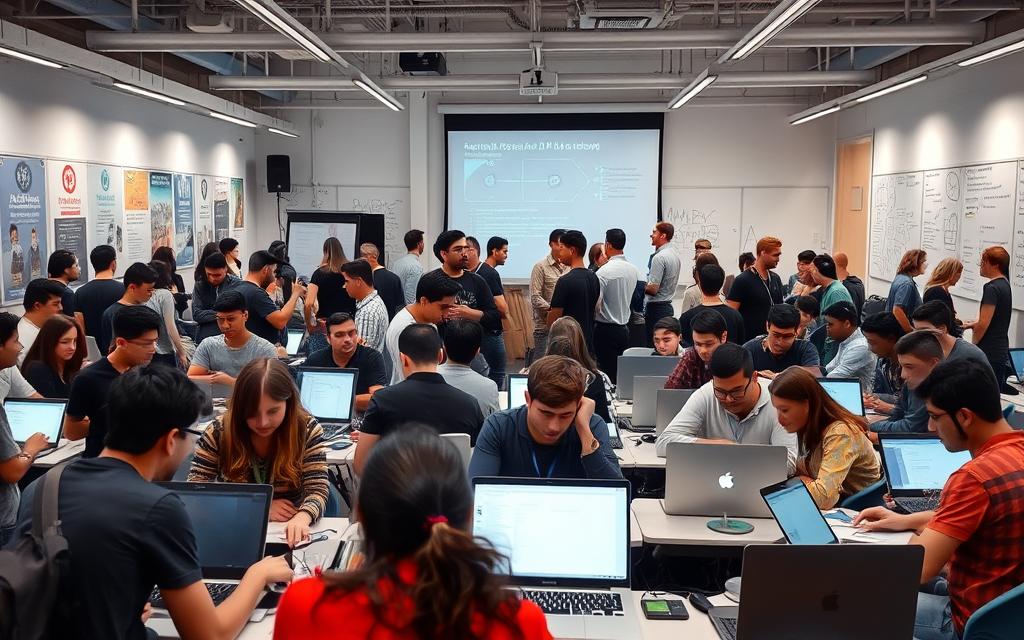Table of Contents
Artificial intelligence is transforming industries at an unprecedented pace. With a projected market value of $1.5 trillion by 2030, this field offers immense potential. Careers in machine learning and related areas are booming, with a 26% growth expected in research roles.
This guide simplifies the journey for newcomers. Whether you’re a tech enthusiast or exploring fresh opportunities, AI welcomes diverse backgrounds. Experts like Allie K. Miller emphasize that non-engineers also thrive in this space.
Discover education paths, essential skills, and emerging job roles. Learn how startups and corporations alike leverage machine learning. The future belongs to those who adapt—let’s explore your next steps.
Why the AI Business Is a Lucrative Opportunity
Machine learning careers dominate today’s job market with explosive growth. The Bureau of Labor Statistics predicts a 23% surge in related roles by 2032—far outpacing the 5% average across all occupations. Demand spans from startups to Fortune 500 companies, with salaries reflecting this urgency.
The rapid growth of AI jobs
Indeed ranks machine learning engineers and data scientists as top jobs for five consecutive years. Specialists in these fields earn $122,000 annually on average—17% more than data engineers. Roles require expertise in algorithms, neural networks, and predictive modeling.
Entry-level positions also thrive. Glassdoor reports a 34% increase in junior AI analyst postings since 2021. Remote work options further expand opportunities globally.
Industries leveraging AI technology
Four sectors drive adoption:
- Healthcare: AI accelerates drug discovery, reducing trial periods by 30% (Rock Content).
- Finance: Fraud detection systems save banks $12 billion yearly.
- Manufacturing: Predictive maintenance cuts downtime by 45%.
- Retail: Dynamic pricing boosts profits by 10–15%.
| Role | Average Salary | Growth Projection |
|---|---|---|
| Machine Learning Engineer | $122,000 | 28% (2023–2030) |
| Data Scientist | $113,000 | 22% |
| Robotics Engineer | $105,000 | 31% |
Emerging fields like climate tech and robotics offer untapped potential. Startups using machine learning for carbon capture secured $2.3 billion in funding last year. As industries evolve, adaptability becomes the ultimate career asset.
Understanding the AI Landscape
From chatbots to self-driving cars, AI applications redefine modern technology. This field blends theoretical research with industry-specific solutions, creating opportunities worldwide. Below, we explore key sectors and emerging trends shaping the future.
Key sectors within AI
Natural Language Processing (NLP) powers tools like ChatGPT and Zendesk’s chatbots. These applications streamline customer service, reducing response times by 40%.
Computer vision transforms agriculture through John Deere’s autonomous tractors. Cameras and sensors analyze crops, boosting yields by 20%.

Reinforcement learning, showcased by AlphaGo, optimizes decision-making in logistics and gaming. Companies use it to automate warehouse operations.
Emerging trends in artificial intelligence
2024 brings a shift from generative AI to enterprise-ready tools. Key developments include:
- Multimodal AI: Systems like GPT-4 process text, images, and audio simultaneously.
- Small language models: Efficient alternatives for businesses with limited data.
- Regulation frameworks: Governments draft policies for ethical AI deployment.
| Industry | AI Application | Impact |
|---|---|---|
| Legal | Casetext’s CoCounsel | Reduces case review time by 70% |
| Creative | Adobe Firefly | Generates custom graphics in seconds |
| Healthcare | AI diagnostics | Improves accuracy by 35% |
Real-world adoption accelerates as industries prioritize scalable solutions. Startups and corporations alike invest in this expanding field.
Educational Pathways to Enter the AI Business
Education opens doors in the fast-evolving world of intelligent systems. Structured programs and flexible certifications cater to diverse backgrounds. Whether pursuing a computer science degree or self-paced courses, options abound.
Degrees That Pave the Way
Traditional degrees provide deep foundations. The University of London’s computer science program covers algorithms and neural networks. CU Boulder’s Data Science degree emphasizes real-world analytics.
Certifications supplement formal education. Google AI Essentials teaches practical applications, while IBM’s Coursera program focuses on fundamentals.
Certifications and Online Learning
Platforms like Coursera and Fast.ai offer specialized courses. Andrew Ng’s Machine Learning Specialization suits beginners, whereas Fast.ai targets practitioners.
| Program | Provider | Cost | Duration |
|---|---|---|---|
| MS in Computer Science | Georgia Tech | $7,000 | 2–3 years |
| AWS ML Certification | Amazon | $300 | 3 months |
| NVIDIA DLI Workshops | NVIDIA | Free–$500 | 1–2 weeks |
Hybrid paths combine degrees with certifications. A physics graduate might pair their degree with NVIDIA’s workshops. This approach balances theory and hands-on learning.
Essential Skills to Succeed in AI
Success in artificial intelligence demands a balanced mix of technical expertise and interpersonal abilities. Professionals must navigate complex algorithms while explaining results to non-technical stakeholders. This dual requirement separates competent practitioners from exceptional ones.
Technical skills: Programming and data analysis
Python remains the dominant language, with Pandas and NumPy libraries handling 78% of data manipulation tasks. SQL complements these skills for database management. Frameworks like PyTorch and TensorFlow power most neural network implementations.
Effective practitioners demonstrate:
- Ability to build convolutional neural networks (CNNs) from scratch
- Experience optimizing PySpark pipelines for large datasets
- Version control proficiency using GitHub Copilot
Soft skills: Communication and problem-solving
LinkedIn data shows 78% of hiring managers prioritize collaboration over raw technical ability. Clear communication bridges the gap between data teams and business units. Presenting AUC metrics in simple terms often determines project approval.
Key methodologies include:
- CRISP-DM framework for structured data projects
- Agile principles for rapid AI prototyping
- Active listening techniques for requirement gathering
| Skill Type | Tools/Methods | Impact |
|---|---|---|
| Programming | Python, SQL | 85% job postings require |
| Data Analysis | Pandas, NumPy | 3× faster processing |
| Team Collaboration | JIRA, Slack | 40% productivity boost |
Problem-solving shines when technical and soft skills combine. Successful teams balance data engineering precision with business analyst perspectives. This synergy drives innovation across industries.
Top AI Job Roles and Their Salaries
Salaries for AI-focused roles reflect the growing need for specialized expertise. Companies compete fiercely for talent, offering six-figure compensation and rapid career growth. Below, we break down key positions shaping this dynamic field.

AI Engineer
AI engineers design end-to-end systems, integrating machine learning models into applications. Average earnings reach $120,000 annually, with senior roles exceeding $160,000. Industries like finance and e-commerce value their ability to deploy scalable solutions.
Machine Learning Engineer
Focused on algorithms, ML engineers earn $122,000 on average. The role demands expertise in frameworks like TensorFlow and PyTorch. A 2024 Indeed report notes a 34% surge in computer vision specialties within this category.
Data Scientist
Data scientists analyze complex datasets, commanding $116,000 yearly. Their work drives decision-making in healthcare and retail. Entry-level positions often require proficiency in Python and SQL.
Robotics Engineer
With a median salary of $112,000, these engineers build autonomous systems. Automotive sectors pay 18% more than healthcare for this role. Demand spikes in manufacturing and logistics.
| Role | Salary | Growth (2024) |
|---|---|---|
| AI Engineer | $120,000 | 27% |
| ML Engineer | $122,000 | 28% |
| Data Scientist | $116,000 | 22% |
| Robotics Engineer | $112,000 | 31% |
Emerging roles like AI product managers see 41% higher demand. Ethics auditors also gain traction as regulations tighten. Career paths often progress from junior analyst to lead architect within five years.
How to Get Into the AI Business Without a Degree
Many top professionals launched careers through alternative paths. The field prioritizes demonstrable skills, creating opportunities for self-taught talent. Platforms like Kaggle and Hugging Face now serve as virtual classrooms.

Essential Learning Resources
Begin with freeCodeCamp’s machine learning curriculum. Its hands-on approach builds knowledge through coding challenges. Kaggle’s micro-courses offer datasets for immediate practice.
Key platforms to explore:
- Hugging Face tutorials for NLP applications
- Fast.ai’s practical deep learning course
- Kaggle Learn’s Python data science track
Crafting a Standout Portfolio
Employers value tangible projects over certificates. A COVID-19 prediction model demonstrates epidemiological analysis skills. Retail forecasting apps showcase business impact potential.
“Your GitHub repository is your new transcript.”
Follow this six-month roadmap:
- Master Python basics (Month 1-2)
- Build a Twitter sentiment analyzer (Month 3)
- Deploy a Flask API with model endpoints (Month 4-6)
Community validation accelerates growth. Contributing to Apache MXNet beats passive learning. Kaggle competition rankings provide third-party skill verification.
| Path | Time Investment | Outcome |
|---|---|---|
| Open-source contributions | 10 hrs/week | Industry connections |
| Competition rankings | 15 hrs/week | Public achievements |
| Freelance projects | Variable | Paid experience |
One Google AI resident transitioned from music theory using these methods. Their weather prediction project outperformed doctoral candidates’ work. Practical results often eclipse academic pedigrees.
Gaining Practical Experience in AI
Real-world applications accelerate learning faster than any classroom setting. Building functional prototypes and solving actual problems creates tangible experience that employers prioritize. This hands-on approach bridges theory and execution.

Strategic Internship Opportunities
Top programs like NASA AI Research and Tesla Autopilot offer immersive internships. These roles provide mentorship while working on cutting-edge projects. Georgia Tech OMSCS students often secure positions through demonstrated coursework.
Alternative approaches include:
- Cold outreach to Series A startups needing ML support
- Google’s Machine Learning Bootcamp for structured apprenticeships
- Freelance data labeling work on Upwork to build fundamentals
Competitions That Build Credibility
Platforms like DrivenData host challenges with real-world datasets. Winning solutions often lead to job offers or investor interest. Local university hackathons also provide low-pressure environments to collaborate with peers.
Key benefits of competitions:
- Exposure to industry-standard evaluation metrics
- Opportunities to team with diverse skill sets
- Portfolio pieces demonstrating applied knowledge
“Your competition rankings serve as third-party validation of skills.”
For those transitioning careers, custom ChatGPT plugins showcase adaptable experience. These projects prove ability to deploy models—a skill 83% of hiring managers prioritize according to LinkedIn’s AI career guide.
Networking and Mentorship in the AI Industry
Mentorship separates thriving professionals from those struggling alone. Strategic connections provide guidance, job referrals, and collaborative opportunities. The industry rewards those who actively engage with communities and thought leaders.
Finding AI Mentors and Communities
Platforms like SharpestMinds match learners with experienced professionals. These structured programs often include code reviews and career coaching. AI Mentors Circle focuses specifically on women in machine learning.
Effective outreach follows three principles:
- Personalized LinkedIn messages referencing shared interests
- Offer to contribute to open-source projects
- Clear asks like 15-minute coffee chats
Attending AI Conferences and Events
NeurIPS delivers cutting-edge research for technical people. MAICON better suits marketing professionals applying AI solutions. Virtual attendance options make global events accessible.
Maximize conference ROI by:
- Pre-scheduling meetings via event apps
- Focusing on workshop participation over passive listening
- Following up within 48 hours with new contacts
“One conversation at NeurIPS led to my current role at DeepMind.”
Local meetups often yield stronger network bonds than massive conferences. Leading study groups establishes credibility while helping peers. These efforts compound over time, creating a robust professional network.
Leveraging AI Tools and Platforms
Powerful AI tools now empower professionals across industries with intelligent automation. These solutions range from no-code platforms for beginners to specialized frameworks for developers. Selecting the right technology stack accelerates project success while minimizing learning curves.
Essential Tools for New Users
Beginners benefit from versatile applications like ChatGPT for general queries and content generation. Galileo provides monitoring for large language models, while Runway simplifies creative tasks through intuitive interfaces.
Key considerations when choosing platforms:
- GitHub Copilot excels for developers needing code suggestions
- Akkio serves business teams without programming backgrounds
- IBM’s AI Fairness 360 ensures ethical model deployment
Strategic Implementation Approaches
HR departments successfully integrate HireVue for candidate screening, reducing hiring time by 40%. Marketing teams leverage Jasper.ai for content creation, maintaining brand voice across channels.
Effective adoption follows three phases:
- Identify repetitive tasks with measurable outcomes
- Run controlled pilot projects with defined success metrics
- Scale solutions based on proven ROI
| Industry | Specialized Platform | Primary Use Case |
|---|---|---|
| Healthcare | Monai | Medical imaging analysis |
| Finance | H2O.ai Driverless AI | Fraud detection |
| Retail | Dynamic Yield | Personalized recommendations |
Implementation frameworks help teams measure impact. Start with weekly progress reviews before committing to enterprise-wide deployment. The right tools combined with structured adoption create sustainable advantages.
Building an AI-First Business
The startup ecosystem for intelligent systems offers both massive potential and unique hurdles. Companies like Scale AI ($7.3B valuation) prove specialized solutions outperform generic platforms. Yet MIT research shows 90% fail within three years—often from misaligned product-market fit.
Strategic approaches for new ventures
Problem-first founders identify pain points before developing tech. Replit targeted coding education gaps before building its collaborative IDE. Tech-first teams like Midjourney leveraged novel diffusion models to create new creative markets.
Critical early decisions include:
- Funding paths: NSF SBIR grants support research-heavy projects, while Y Combinator favors rapid scaling
- Talent models: Equity packages attract specialists away from FAANG salaries
- Pivot readiness: Stability AI successfully shifted from music generation to visual art tools
Navigating common obstacles
Data scarcity derails many early-stage business ideas. Hugging Face overcame this by building open-source community datasets. Other challenges include:
- Regulatory uncertainty in healthcare and finance sectors
- Compute costs exceeding $500k/year for large models
- Client education requirements in non-technical industries
“Fail fast with cheap experiments before committing engineering resources.”
| Challenge | Solution | Example |
|---|---|---|
| Data Access | Synthetic generation | Gretel.ai’s privacy tools |
| Talent Shortage | Remote global teams | GitLab’s async workflow |
| Market Education | Interactive demos | RunwayML’s try-before-buy |
The future belongs to adaptable founders. Those combining technical vision with business discipline carve sustainable paths in this dynamic space.
AI Job Search Strategies
Employers evaluate candidates through multiple lenses, from GitHub activity to system design skills. Standing out requires tailored approaches for each hiring stage. Both startups and tech giants prioritize demonstrated impact over generic qualifications.
Crafting a Resume That Gets Noticed
Quantifiable achievements outperform course listings. Instead of “Completed Coursera ML course,” write “Optimized TensorFlow model achieving 92% validation accuracy.” Hiring managers scan for specific frameworks and metrics.
ATS optimization requires strategic keyword placement:
- Include “transformers” and “BERT” if applying for NLP roles
- List cloud platforms like AWS SageMaker
- Highlight deployment tools such as Docker
Effective portfolios combine:
- Interactive Streamlit apps showing end-to-end projects
- Detailed GitHub READMEs with problem-solving narratives
- Video demos for complex visualizations
Mastering the Interview Process
Technical screenings often involve:
| Company Type | Assessment Format | Preparation Resource |
|---|---|---|
| Startups | Take-home challenges (e.g., Shopify data pipeline) | Kaggle past solutions |
| Tech Giants | Whiteboarding (Meta system design) | LeetCode Hard patterns |
For salary negotiations:
- Reference Levels.fyi data for role-specific benchmarks
- Highlight unique skills like PySpark optimization
- Consider equity packages at pre-IPO companies
“Treat interviews as collaborative problem-solving sessions rather than tests.”
Non-traditional candidates should emphasize transferable skills. A physics degree holder might showcase mathematical modeling projects. Every application tells a story—make yours compelling.
Staying Ahead in the AI Industry
The AI landscape evolves faster than most professionals can track. Success demands proactive strategies to master emerging tools and methodologies. Those who thrive combine structured learning with real-time trend analysis.
Continuous Learning and Skill Development
Quarterly upskilling cycles keep skills relevant. Platforms like DeepLearning.AI offer specialized tracks for frameworks like PyTorch 2.0. Stanford’s CS330 course provides advanced multi-task learning techniques.
- Leading TensorFlow SIGs to deepen community knowledge
- Writing technical blogs to reinforce understanding
- Auditing academic papers on arXiv weekly
Keeping Up With Advancements
Allie K. Miller’s LinkedIn insights decode complex trends. The Batch newsletter summarizes breakthroughs in digestible formats. Key areas to monitor:
- Ethical frameworks (Microsoft’s Responsible AI Toolkit)
- Hardware innovations like neuromorphic chips
- Regulatory shifts in the EU and U.S.
| Resource | Focus Area | Frequency |
|---|---|---|
| arXiv | Academic research | Daily |
| ML Papers Podcast | Breakdowns | Weekly |
| TWIML AI Podcast | Industry trends | Biweekly |
The future belongs to those who treat education as iterative. Balancing hands-on practice with strategic awareness creates lasting impact.
Conclusion
Global demand for AI skills creates unprecedented opportunities for diverse backgrounds. From mastering Python to deploying models, each step builds toward a thriving career.
PwC predicts AI could boost global GDP by $15.7 trillion. Start with Google’s AI Essentials course to join this revolution. Quantum computing and neuro-symbolic systems will shape the next decade.
Former teachers and artists now lead ML teams. Your journey begins today—success favors those who act. The future of intelligence is here.
FAQ
What industries are leveraging AI technology?
AI is transforming healthcare, finance, retail, manufacturing, and logistics. Companies like Google, Amazon, and Tesla use AI for automation, data analysis, and customer service.
What are the key sectors within AI?
Major sectors include machine learning, natural language processing, computer vision, robotics, and deep learning. Each has unique applications in real-world scenarios.
Which degrees help in starting an AI career?
Computer science, data science, mathematics, and engineering degrees provide a strong foundation. Many professionals also transition from physics or statistics backgrounds.
Can I enter the AI field without a degree?
Yes. Self-learning through platforms like Coursera, Udacity, and edX, along with hands-on projects, can help you build expertise. Employers value skills over formal education.
What technical skills are essential for AI jobs?
Proficiency in Python, R, TensorFlow, and PyTorch is crucial. Data analysis, algorithm development, and cloud computing (AWS, Azure) are also highly sought-after skills.
How do I gain practical experience in AI?
Internships, freelance projects, and AI competitions like Kaggle offer real-world exposure. Open-source contributions also enhance your portfolio.
What AI job roles have the highest salaries?
AI Engineers, Machine Learning Engineers, and Data Scientists earn six-figure salaries. Robotics Engineers and NLP Specialists also command competitive pay.
How important is networking in the AI industry?
Networking is vital. Join communities like AI Meetups, LinkedIn groups, or attend conferences like NeurIPS. Mentors can provide guidance and job referrals.
What AI tools should beginners learn first?
Start with TensorFlow, Keras, and scikit-learn. Tools like Jupyter Notebooks and Tableau are also useful for data visualization and model training.
How can I stay updated with AI advancements?
Follow AI research papers on arXiv, subscribe to newsletters like The Batch by DeepLearning.AI, and take advanced courses to keep skills sharp.









